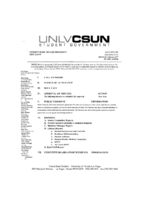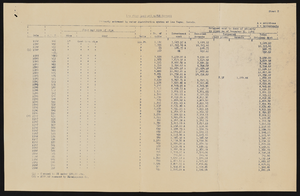Search the Special Collections and Archives Portal
Search Results
The Story of Classic Las Vegas Oral History Interviews
Identifier
Abstract
Archival Collection
Bob Coffin Political Papers
Identifier
Abstract
The Bob Coffin Political Papers (approximately 1861-2021) document the political career of independent Democrat Bob Coffin who served in the Nevada Assembly, State Senate, and Las Vegas City Council from 1983 to 2019. Collection materials primarily consist of legislative research files associated with Coffin's committee assignments. City Council records in this collection include budget files, constituent concerns, and city project files. The collection also includes election materials used for Coffin's political campaigns and include posters, mailers, as well as newspaper clippings and information on Coffin's opponents.
Archival Collection
Thomas Hickey Political Papers
Identifier
Abstract
The Thomas Hickey Political Papers (1964-1996) contain the professional files of Hickey’s career as a Nevada State Assemblyman and Senator. Materials include constituent correspondence, voting records, memoranda, newspaper clippings, bills, and research documentation on topics such as the Yucca Mountain Nuclear Waste Repository, the Equal Rights Amendment (ERA), education, health, prisons, finance, and Nevada infrastructure. The collection highlights Hickey’s role on committees including finance, transportation, government affairs, and ways and means.
Archival Collection

Meeting minutes for Consolidated Student Senate University of Nevada, Las Vegas, September 06, 1995
Date
Archival Collection
Description
Text

Meeting minutes for Consolidated Student Senate, University of Nevada, Las Vegas, February 25, 2008
Date
Archival Collection
Description
Text

Meeting minutes for Consolidated Student Senate, University of Nevada, Las Vegas, March 10, 2000
Date
Archival Collection
Description
Text

Lindsay Wenger oral history interview: transcript
Date
Archival Collection
Description
Oral history interview with Lindsay Wenger conducted by Barbara Tabach on March 13, 2018 for the Remembering 1 October Oral History Project. In this interview, Lindsay Wenger discusses her move to Las Vegas, Nevada in 2013 for her residency at the University Medical Center of Southern Nevada (UMC). She talks about her experience on the night of the October 1, 2017 mass shooting and recalls a few specific patients she treated throughout the night and into the morning. After discussing the events at the hospital, she explains how she has been emotionally affected and how her view of Las Vegas as a community has changed.
Text
Maurine and Fred Wilson and Dr. William S. Park Photograph Albums
Identifier
Abstract
The Maurine and Fred Wilson and Dr. William S. Park Photograph Albums (1900-1930s) consist of twelve albums containing black-and-white photographic prints and three black-and-white photographic negatives. The photographs are primarily related to the families of William S. Park, John S. Park, and Fred and Maurine Hubbard Wilson. Included are images of the Park homes in Las Vegas, Nevada; Park and Wilson family members; scenes of early Las Vegas, Nevada; outdoor activities, and vacation trips to California, Colorado, and Mexico.
Archival Collection
Byrd Wall Sawyer Collection
Identifier
Abstract
The Byrd Wall Sawyer Collection primarily consists of Byrd's research files on Nevada from 1930 to 1970. The materials concentrate on her monograph, "Nevada Nomads," as well as her co-authored textbook, "Here is Nevada." The collection also includes speeches, journal articles, memos, research note cards and papers, correspondence, informational booklets and pamphlets, maps, photographs, audiovisual materials, and newspaper articles and clippings.
Archival Collection

